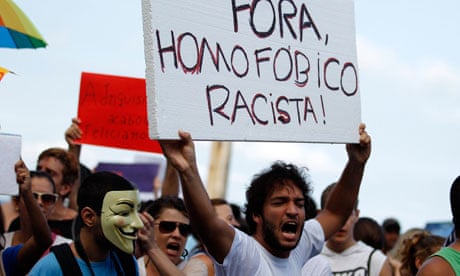The Commission for Human Rights and Minorities in Brazil's lower house of parliament is supposed to promote tolerance and understanding, but it is now embroiled in an unholy row over the controversial preacher who recently became its president.
Marco Feliciano, an evangelical pastor from the Christian Social party, is accused of homophobia, racism and excluding outsiders from sessions that were previously open to the public.
As of Wednesday night, the commission decided to hold meetings behind closed doors to prevent disruptions from critics of its president, who has become a focus of concerns that Brazil is becoming a less liberal nation.
Human rights groups and celebrities have called for the resignation of Feliciano on the grounds of his apparent bigotry.
On his Twitter page Feliciano recently said that Aids was a "gay cancer". He has previously stated that Africans are "cursed since the times of Noah". The politician denies that his comments or views are prejudiced.
Feliciano was appointed last month as a result of horse-trading for key positions in Congress among the main parties. As the only candidate for his post, his suitability was not called into question by politicians, but civil society has erupted in indignation.
"A bigoted congressman should not run a commission aimed at ending prejudice," noted the country's largest online campaign group Avaaz in a petition for his resignation that has attracted 465,000 signatures.
The Folha de São Paulo newspaper ran an online poll asking whether Feliciano should step down. Despite a campaign by the congressman and his supporters, 80.6% of the 100,320 respondents agreed that he should go.
Anonymous, a group of internet hackers, has joined the campaign by releasing what it says are documents about Feliciano's financial backers.
The office of the commission declined the Guardian's request for a comment. But the congressman has publicly vowed not to buckle in the face of his critics, whom he accuses of taking his comments out of context.
"I am not homophobic," Feliciano said in a recent sermon.
He added: "I am against their promiscuity. I don't want my daughters to go out on the streets and see men with shaved legs kissing each other. The Brazilian family must be respected."
He has written on Twitter that his comments about Noah do not constitute racism and said in interviews that his mother and stepfather are black.
He has failed to convince a growing number of celebrities who have come out against him.
One of the country's most popular singers, Daniela Mercury, told the G1 news website on Wednesday that she was in a lesbian relationship with journalist Malu Vercosa: "I am in love with Malu, with Brazil, with individual freedoms. We cannot ignore the conquests we have achieved. We cannot walk backward like the Felicianos of the world."
The outcry has spread to street protests in Copacabana and a demonstration outside the Brazilian embassy in Paris.
The work of the commission – which is supposed to draw up legislation and consider cases of human rights violations – has also been disrupted by activists.
Feliciano has won support from many in the evangelical Christian movement, which is a growing force in Brazilian politics.
His Twitter stream includes words of endorsement from numerous pastors, including one – which Feliciano retweeted – who claimed gay foster parents rape their children.




